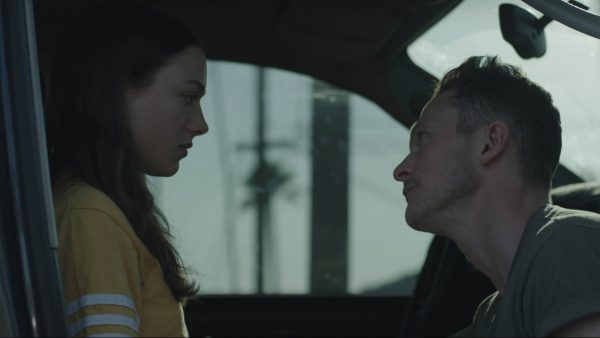Palm Trees and Power Lines, 2022.
Directed by Jamie Dack.
Starring Lily McInerny, Gretchen Mol, Jonathan Tucker, Auden Thornton, Armani Jackson, Kenny Johnston, Michael Petrone, John Minch, Quinn Frankel, Timothy Taratchila, Rhied De Castro, Angel Grey Cooper, Yvette Tucker, and Yolanda Corrales.
SYNOPSIS:
A disconnected teenage girl enters a relationship with a man twice her age. She sees him as the solution to all her problems, but his intentions are not what they seem.
One of the earliest images found in Palm Trees and Power Lines (a hell of a metaphoric title that’s as shattering as the story that unfolds) says everything necessary there is to know Lea (Lily McInerny, a revelation in what could be the most daring, bold, and challenging performance from a newcomer all year) and rationalize her choices. The 17-year-old girl tries to wake her mom up (a somewhat neglectful Gretchen Mol that is more interested in her dating life than what her daughter is up to) for work but is unsuccessful. She says she’s going in to work late. Not even five minutes into this film, it’s evident that there’s not much direction and parenting going on here or a guardian to look up to and learn responsibility from.
There’s also not much to do wherever this alarming story is located, as Lea and her friends (the closest of the bunch is a far more extroverted bestie in Quinn Frankel’s Amber) get involved with everything from dining and ditching to alcohol and sex. Not that there’s anything wrong with teenagers being teenagers trying out new experiences, but there is overwhelming boredom, not much hope for a bright future, absent parents for all involved, and a feeling that Lea is the odd one out when it comes to her inner circle, all just waiting to manifest itself into something reckless and problematic as a form of escape. It also makes her a target for unsettling predators like Tom (Jonathan Tucker delivering a master class performance in intentional cringe; the kind that gets under your skin because you know his words are hollow, and you can’t call his bluff around anyone naïve enough to be taking him seriously).
After her immature friends abandon her, Tom comes to her rescue (following the aforementioned dining and ditching), subsequently helping her get home from a distance inside his car before convincing her to get inside with him as he plays everything cool, asks questions, and tries to figure out her musical taste. He casually admits he’s 34 and doesn’t seem one bit bothered by her being 17. On the same token, she doesn’t seem to care either, considering the mundane life she leads. She is also surprised a handsome older man is interested, plays up her maturity, and wants to care for her.
While this is all textbook grooming, what causes Palm Trees and Power Lines to hit harder is that skilled manipulators like Tom can work that evil magic on anyone. He slowly turns Lea further against her mom, convinces her to hang around her friends less (an obnoxious bunch that feels real even as they try helping Lea in ways that backfire), and plants the idea in her head to run away together. These isolation tactics are horrible, and one of the worst feelings in the world is seeing them work on someone you know is they ignore every red flag you point out. Child or adult, the dynamic at the center of Palm Trees and Power Lines is an examination of subtle manipulation that’s meticulously measured every step of the way, with every verbal suggestion fine-tuned for effect just as much as body language.
Such effectiveness and phenomenal performances are certainly a lot for one project to have, so it’s not too much of a knock when I express slight disappointment that there is no fresh angle or nothing new to be said here. And while it’s a logical decision for director Jamie Dack (also serving as a co-writer alongside Audrey Findlay, it wouldn’t surprise me if both of these women are drawing from past experiences considering how uncomfortable everything on display is here), it’s no surprise where the story is inevitably going. Tom certainly doesn’t have the love in store for Lea. Yes, that’s also not the point, as Lea’s perspective will undoubtedly be a valuable tool for real-life teenagers to catch some of these warning signs, but there is something left desired narratively. Consider it a suffocatingly riveting after-school special on older male stranger danger.
There is, however, one sequence so disturbing and painful to watch that elicits an overbearing feeling of helplessness from watching. Doubly so since the scene is framed at a distance near a door to disorient the viewer, further wishing they could kick that door down and save this girl. Except we can’t—only observing the abuse in its raw, uncompromising naturalism. Hopefully, if Lea doesn’t get out of the relationship (salvaging a bond with her mother might be the only way out), the horrors of Palm Trees and Power Lines save someone else from becoming another victim.
Flickering Myth Rating – Film: ★ ★ ★ ★ / Movie: ★ ★ ★ ★
Robert Kojder is a member of the Chicago Film Critics Association and the Critics Choice Association. He is also the Flickering Myth Reviews Editor. Check here for new reviews, follow my Twitter or Letterboxd, or email me at MetalGearSolid719@gmail.com













